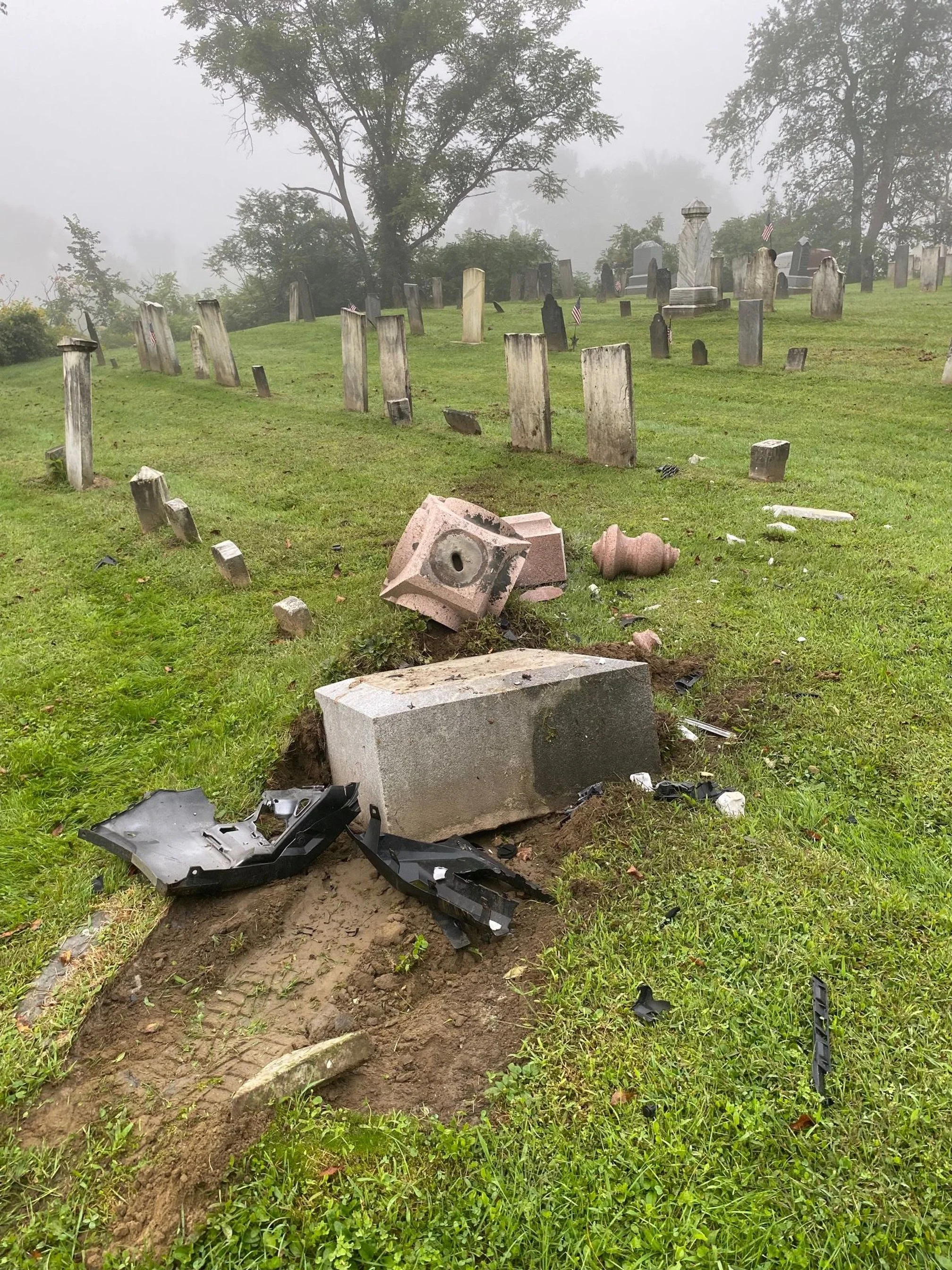Moretown Cemeteries Commission looks to pick up the pieces after hit-and-run damage
Car parts litter the scene of a toppled grave monument at Moretown Village Cemetery on the morning
of Sept. 4. Photo by Mary Murphy-Blake
Will Thorn reported this story on assignment from the Waterbury Roundabout. The Community News Service is a program in which University of Vermont students work with professional editors to provide content for local news outlets at no cost.
MORETOWN – At 7 a.m. on Labor Day, when most people are planning barbecues and beach outings, Mary Murphy-Blake arrived at the Moretown Village Cemetery for her morning inspection to discover the normally well-kept space a total disaster.
“I could see when I approached the stop sign at the foot of Freeman Hill that something was amiss,” said Murphy-Blake, one of three town cemetery commissioners. The cemetery’s fence was crushed. Four or five tablet-sized gravestones had toppled onto their backs. A large red marble monument lay on its side, its finial broken beside it.
What happened? Murphy-Blake wondered. She immediately called the Vermont State Police at the Berlin barracks. Trooper Ryan Riegler showed up soon after. He and Murphy-Blake scoured the scene. They found fog light housings that Riegler said belonged to a Subaru and another vehicle piece that Murphy-Blake described as a silver “chunk.”
From those clues, Riegler determined he was looking for someone who drove a silver Subaru. He took photos of the debris and sent out a news release seeking information from anyone who might know what happened.
The next day, a woman called the barracks. She said she swerved to avoid a deer in the road and rammed into the cemetery, causing the damage, Riegler said. “She was unaware that she needed to call the police when she crashed her car into a cemetery,” she told police during the call. Riegler said he did not know the caller’s identity. Police have not charged anyone in relation to the incident, said Adam Silverman, a spokesman for the Vermont State Police.
Moretown Village Cemetery, whose earliest burial was a man named Rufus Clapp in 1810, is the resting place of many of the town’s earliest residents. The damaged gravestones date back to the mid to late 1800s and the monument is from around 1930. Murphy-Blake said she wasn’t sure the tablet markers could be saved. “They’re broken and pushed away from the site of where they were,” she said.
“The large monument might possibly be able to be put back together, but it’s going to take a lot of work,” Murphy-Blake said. About six feet tall, the fallen monument belongs to the Evans family. It marks the graves of Osgood Evans, who died in 1886; his wife, Mary Bailey Evans, who died four years later; their son George C. Evans, who died in 1913; and George Evans’ wife, Matilda, who died in 1930.
“Hopefully the insurance from the person who struck the monument will cover it, but we don’t know,” Murphy-Blake said. Police have shared insurance information with the town officials but not the identity of the driver, she explained.
She and other cemetery commissioners have contacted three Vermont companies who specialize in restoration. So far they do not have a cost estimate for the repairs.
If the driver’s insurance won’t cover the repair costs, Murphy-Blake said the cemeteries commission would try to contact any family of those buried under the damaged monument to see if they would contribute to the cost.
For general maintenance and the fence repair, the commission has access to town funds. The money, though, will not cover the damage, Murphy-Blake said. The commission would be left in a “gray area” if insurance coverage and family contributions don’t come through, she explained.
According to the Moretown town report, the annual budget for cemeteries this year is the same as in 2022: $7,870. Most of that – $7,750 – is spent on contracted mowing. Just $120 is allocated to other annual expenses.
“I suspect that we, the commissioners, would try our best to rally funds some way or another to get that monument back to where it should be,” Murphy-Blake said.
The incident, she noted, has more significance to the local community than a few knocked-down stones in a field. Monuments like the one marking the Evans family graves have meaning. “It was special,” Murphy-Blake said. “It’s special to the family. It's special to the town. And it’s special historically.”








